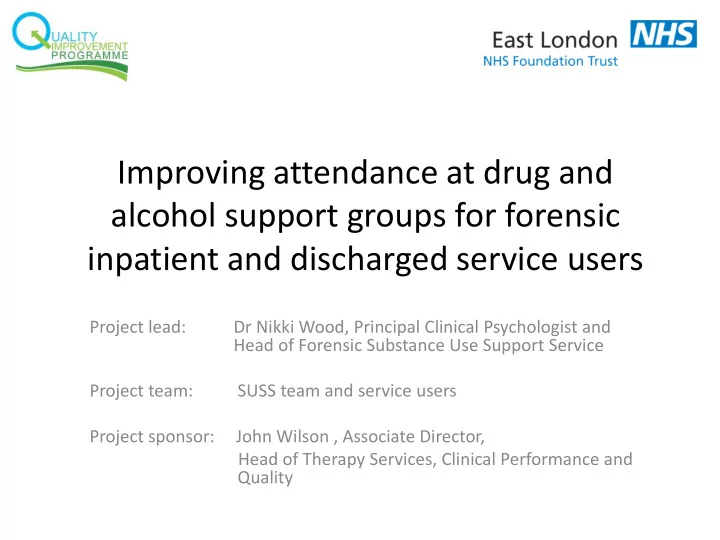

Improving attendance at drug and alcohol support groups for forensic inpatient and discharged service users Project lead: Dr Nikki Wood, Principal Clinical Psychologist and Head of Forensic Substance Use Support Service Project team: SUSS team and service users Project sponsor: John Wilson , Associate Director, Head of Therapy Services, Clinical Performance and Quality
Background • To improve access to drug and alcohol support groups run by the SUSS team for current and ex forensic service users • Service users reported that they preferred to attend groups on their unescorted leave of their own volition in non-stigmatising community environments. • Project aim was to set up groups in the community
AIM PRIMARY DRIVERS SECONDARY DRIVERS CHANGE IDEAS Run groups at a maximum of 40 mins travelling by public transport from hospital, Posters/UIG home or hostel Find suitably located Awareness of groups group rooms in non stigmatising Invitation letters and follow up texts environments Hold groups at most accessible times e.g. afternoon or early Nursing support evening To improve Ensure safety of all Multidisciplinary Ward Team Minimum unescorted leave attendance at drug facilitators through lone Process requirements and alcohol and remote working support groups for policy with access to both pre and post mobile phones discharge forensic Agreed in ward round when service users by requested by SU May 2015 Service user co- facilitator and peer led Community Locations group Patient Choice Non-stigmatising and cost effective Record and review attendance figures, incidences of any Financial - Rooms need to be substance use and Resources pre booked and paid for recalls Staff and SU’S need to be Service user and suitably skilled and facilitator self report experienced to run a drug and satisfaction surveys and alcohol therapy group
Sequence of PDSA’s – for one change idea or secondary driver Cycle 5 : Second therapy group commences. A P S D Cycle 4 : Second location sourced in Dalston with better transport links Cycle 3 : Four regular attendees but service users from JHC and hostels said it was too far away to attend A P Cycle 2 :Self referrals from John Howard Centre and Wolfson S D House sought Cycle 1: Weekly Therapy Group set up at Redmond Community Centre: Manor House, Hackney.
Data • First community group has four regular attendees each week, two of whom have been discharged and continue to attend. No recalls back to hospital (yet). Range 3-5 • Second community group has mean of 5 regular attendees each week, two who have been discharged and three who are approaching discharge. Range of attendance is between 2 and 7 service users, attendance sometimes impacted by loss of leave due to substance use.
Learning and what next? • Very difficult interface between NHS and non-NHS social enterprises, especially around finance. Purchase orders not being put on invoices, having to post invoices, and often to the wrong address, and invoices still not being paid is an ongoing saga. • For a period of time this was made considerably easier when we or suppliers could email invoices directly. • SBS and procurement don’t seem to understand the culture of renting rooms for therapy and so ignore or don’t know how to trace invoices. • Social enterprises struggle to understand the complex invoicing process and so don’t get paid leading to threat of loss of rooms to use and withholding of their services = bad PR for the Trust • Considerable time costs in terms of travel to get to the groups for staff facilitators, made more helpful by having a car. Would be considerably less viable if all facilitators had to travel by public transport.
What next? • All attendees report valuing the group and the more relaxed and non judgemental therapeutic space. Both groups have a self-referred waiting list for when service users have sufficient unescorted leave (minimum two hours). • Service users often lose their unescorted leave if they use or are tempted to use drugs and so therefore cannot attend the groups • Considerable ongoing work is being undertaken with MDT’s in negotiating attendance at the groups as ‘therapeutic leave” even if they have used drugs. • Nursing staff in particular have been very supportive of this project • A third group is needed for services users from NELFT and beyond. Currently looking at potential locations in Ilford, Barking and Dagenham • Text and phone call reminders helpful and we have even done MI by phone and text. Many service users however are unsure about how to use mobiles, especially smart phones. This would be a useful next piece of work or even a QI project!
Recommend
More recommend